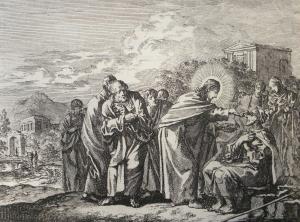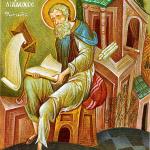
When Jesus encountered a man who was born blind, his disciples asked him why the man was blind: was it something his parents had done, or was it, somehow, something which the man had done which had caused his blindness? Jesus answered: it was neither (cf. Jn. 9:1-3).
The lesson here is simple. While, it is true, what we do, how we act, has consequences for us, and sometimes those consequences have long-standing effects upon us or the world at large, not everything we experience is a direct result of what we or others have specifically done. Sometimes, what we experience in life can be said to be accidental. This is not to say we cannot map out all the interactions which come together to produce a particular event, but sometimes these interactions include things which are out of our control, such as for example, when natural disasters cause havoc in the world. The same can be said of many bodily ailments, like being born blind. We should not assume them to be direct punishments from God (after all, isn’t that what the book of Job is all about?).
When we see people suffering, our duty is to help them, to make sure they are shown proper human dignity and are not mistreated. This is how the glory of God is to be revealed. For in the kingdom of God, the presence of God lifts people up and makes them better. Jesus, revealing the kingdom of God, healed people, like the man born blind, showing the glory of God:
As he said this, he spat on the ground and made clay of the spittle and anointed the man’s eyes with the clay, saying to him, “Go, wash in the pool of Siloam” (which means Sent). So he went and washed and came back seeing (Jn. 9:6-7 RSV).
If help someone who really needs our help, the glory of God is manifest in our actions. Obviously, different people will need different kinds of help, and not everyone will be able to help the same way. Doctors, serving the sick, are manifesting the glory of God in the world as they heal their patients. But those who give to the poor, making sure the poor and needy receive the food, shelter, clothing, companionship, and love they need, are also manifesting the glory of God in the world.
Anyone who focuses on the person needing help, finding some excuse to ignore their plight, are like those who deemed the man born blind was such because of some sin he or his parents had done. They are trying to find reasons to justify indifference, to blame those who need help for their need, so as to justify doing nothing. “They deserve it, so why should I do anything to help?” Likewise, if they cannot find a good reason as to why someone suffers, they end up finding reasons to blame those who try to help those who suffer. This is exactly what we find happened with the man born blind: Jesus’ critics condemned Jesus for healing on the Sabbath (cf. Jn. 9:16). It is important to note that not all those who examined the man born blind after he was healed was of this opinion; some saw God was at work, and so, we must keep in mind, not all the religious of Jesus’ time were hostile to Jesus and the work which he accomplished.
St. John Chrysostom, however, found the challenge itself was important. For it is by being challenged the miracle became known and believed:
Observe in how many ways they attempt to obscure and take away the miracle. But this is the nature of truth, by the very means by which it seems to be assailed by men, by these it becomes stronger, it shines by means of that by which it is obscured. For if these things had not taken place, the miracle might have been suspected by the many; but now, as if desiring to lay bare the truth, so do they use all means, and would not have acted otherwise, supposing they had done all in Christ’s behalf. [1]
Jesus’ critics, far from harming Jesus, or obscuring his work, actually worked in his favor. This is how God works. Even those who seem to act against him find that God has a way of transforming the situation for his favor. Is that not what we learn with the cross? And so, it should not be surprising, that many who stood against Jesus became his disciples, just as many who later opposed Jesus’ disciples would themselves become Christians. Thus, when Paul and Silas were thrown in jail, we find their jailer would eventually become a believer and a disciple of Christ:
But about midnight Paul and Silas were praying and singing hymns to God, and the prisoners were listening to them, and suddenly there was a great earthquake, so that the foundations of the prison were shaken; and immediately all the doors were opened and every one’s fetters were unfastened. When the jailer woke and saw that the prison doors were open, he drew his sword and was about to kill himself, supposing that the prisoners had escaped. But Paul cried with a loud voice, “Do not harm yourself, for we are all here.” And he called for lights and rushed in, and trembling with fear he fell down before Paul and Silas, and brought them out and said, “Men, what must I do to be saved?” And they said, “Believe in the Lord Jesus, and you will be saved, you and your household.” And they spoke the word of the Lord to him and to all that were in his house. And he took them the same hour of the night, and washed their wounds, and he was baptized at once, with all his family. Then he brought them up into his house, and set food before them; and he rejoiced with all his household that he had believed in God (Acts 16:26-34 RSV).
God reveals himself and his glory in the way Christians deal with others. The healing power of God’s love is not something which we try to possess for ourselves only but rather we must share with all. If we find excuses to ignore the needs of others, we reveal ourselves to be those who are truly blind and not walking by the light of Christ. For we are meant to follow Christ, to look after and help those in need. Jesus manifested himself, and therefore the glory of God, by being the light to the world, healing those who needed healing, loving those who needed love. We, therefore, need to manifest the same light into the world, reflecting the light which has been given to us by Jesus. In this way, the kingdom of God is revealed as it is shared by those following after the light of God’s love.
[1] St John Chrysostom, “Homilies on the Gospel of St John” in NPNF1(14):207 [Hom. 58].
Stay in touch! Like A Little Bit of Nothing on Facebook.
If you liked what you read, please consider sharing it with your friends and family!













